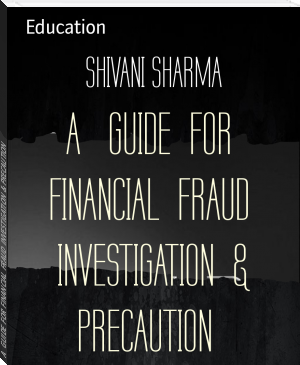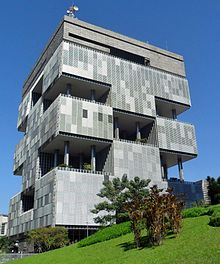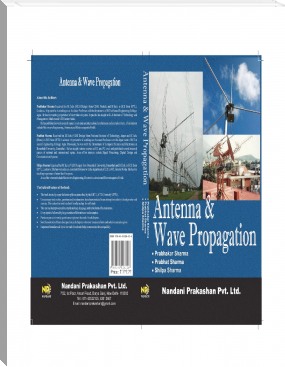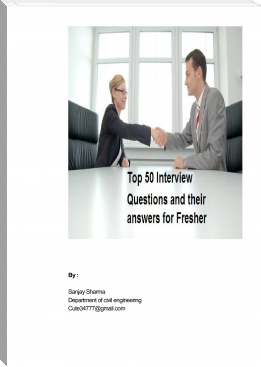A GUIDE FOR FINANCIAL FRAUD INVESTIGATION & PRECAUTION, SHIVANI SHARMA [read my book txt] 📗

- Author: SHIVANI SHARMA
Book online «A GUIDE FOR FINANCIAL FRAUD INVESTIGATION & PRECAUTION, SHIVANI SHARMA [read my book txt] 📗». Author SHIVANI SHARMA
Business leaders, of course, had long been working to "merchandise" themselves through the appropriation of religion. In organizations such as Spiritual Mobilization, the prayer breakfast groups, and the Freedoms Foundation, they had linked capitalism and Christianity and, at the same time, likened the welfare state to godless paganism.[57]Corruption in philosophy[edit]
19th century German philosopher Arthur Schopenhauer acknowledges that academics, including philosophers, are subject to the same sources of corruption as the society they inhabit. He distinguishes the corrupt "university" philosophers, whose "real concern is to earn with credit an honest livelihood for themselves and ... to enjoy a certain prestige in the eyes of the public"[58] from the genuine philosopher, whose sole motive is to discover and bear witness to the truth.
To be a philosopher, that is to say, a lover of wisdom (for wisdom is nothing but truth), it is not enough for a man to love truth, in so far as it is compatible with his own interest, with the will of his superiors, with the dogmas of the church, or with the prejudices and tastes of his contemporaries; so long as he rests content with this position, he is only a φίλαυτος [lover of self], not a φιλόσοφος [lover of wisdom]. For this title of honor is well and wisely conceived precisely by its stating that one should love the truth earnestly and with one’s whole heart, and thus unconditionally and unreservedly, above all else, and, if need be, in defiance of all else. Now the reason for this is the one previously stated that the intellect has become free, and in this state, it does not even know or understand any other interest than that of truth.[59]Corporate corruption[edit]See also: Corporate crime
 Petrobras headquarters in downtown Rio de Janeiro.
Petrobras headquarters in downtown Rio de Janeiro.
In criminology, corporate crime refers to crimes committed either by a corporation (i.e., a business entity having a separate legal personality from the natural persons that manage its activities), or by individuals acting on behalf of a corporation or other business entity (see vicarious liability and corporate liability). Some negative behaviours by corporations may not be criminal; laws vary between jurisdictions. For example, some jurisdictions allow insider trading.
Further information: Operation Car Wash
Petróleo Brasileiro S.A. — Petrobras, more commonly known as simply Petrobras (Portuguese pronunciation: [ˌpɛtɾoˈbɾas]), is a semi-public Brazilian multinational corporation in the petroleum industry headquartered in Rio de Janeiro, Brazil. The company's name translates to Brazilian Petroleum Corporation — Petrobras. The company was ranked #58 in the 2016 Fortune Global 500 list.[60] It is being investigated over corporate and political collusion and corruption.[61]
Odebrecht is a privately held Brazilian conglomerate consisting of diversified businesses in the fields of engineering, real estate, construction, chemicals and petrochemicals. The company was founded in 1944 in Salvador da Bahia by Norberto Odebrecht, and the firm is now present in South America, Central America, North America, the Caribbean, Africa, Europe and the Middle East. Its leading company is Norberto Odebrecht Construtora [pt].[62]Odebrecht is one of the 25 largest international construction companies and is still led by Odebrecht family.
The firm's executives were examined during Operation Car Wash part of an investigation over Odebrecht Organization bribes to executives of Petrobras, in exchange for contracts and influence.[63][64][61] Operation Car Wash is an ongoing criminal money laundering and bribes related corporate crime investigation being carried out by the Federal Police of Brazil, Curitiba Branch, and judicially commanded by Judge Sérgio Moro since March 17, 2014.[65][66][67][61]
Arms for cash[edit]
When placing this tag, consider associating this request with a WikiProject. (January 2018)
"Arms for cash" can be done by either a state-sanctioned arms dealer, firm or state itself to another party it just in regards regards as only a good business partner and not political kindred or allies, thus making them no better than regular gun runners. Arms smugglers, who are already in to Arms trafficking may work for them on the ground or with shipment. The money is often laundered and records are often destroyed. [68] It often breaks UN, national or international law.[68] Payment can also be in strange or indirect ways like arms paid for in post-war oil contracts, post-war hotel ownership, conflict diamonds, corporate shares or the long term post-war promises of superfus[clarification needed] future contracts between the parties involved in it, etc...
Main article: Mitterrand–Pasqua affair
In 2006 Transparency International ranked Angola a lowly 142 out of 163 countries in the Corruption Perception Index just after Venezuela and before the Republic of the Congo with a 2.2 rating.[69][70] Angola was at 168th place (out of 178 countries) on Transparency International’s Corruption Perceptions Index (CPI), receiving a 1.9 on a scale from 0 to 10.[71] On the World Bank's 2009 Worldwide Governance Index, Angola had done very poorly on all six aspects of governance assessed. While its score for political stability improved to 35.8 in 2009 (on a 100-point scale) from 19.2 in 2004, Angola earned especially low scores for accountability, regulatory standards, and rule of law. The score for corruption declined from an extremely low 6.3 in 2004 to 5.2 in 2009.[72][73]
The country is regarded poorly and that corruption is wounding the economy badly despite the emerging oil industries wealth.[72]
The Mitterrand–Pasqua affair, also known informally as Angolagate, was an international political scandal over the secret and illegal sale and shipment of arms from the nations of Central Europe to the government of Angola by the Government of France in the 1990s. It led to arrests and judiciary actions in the 2000s, involved an illegal arms sale to Angola despite a UN embargo, with business interests in France and elsewhere improperly obtaining a share of Angolan oil revenues. The scandal has subsequently been tied to several prominent figures in French politics.[72]
“Angolagate”, which was carried out and uncovered over the course of the 1990s. 42 individuals, including: 42 people, including Jean-Christophe Mitterrand, Jacques Attali, Charles Pasqua and Jean-Charles Marchiani, Pierre Falcone. Arcadi Gaydamak, Paul-Loup Sulitzer, Union for a Popular Movement deputy Georges Fenech, Philippe Courroye [fr] the son of François Mitterrand and a former French Minister of the Interior, were all charged, accused, indicted or convicted with illegal arms trading, tax fraud, embezzlement, money laundering and other crimes.[72][74] "[75]
Methods[edit]
In systemic corruption and grand corruption, multiple methods of corruption are used concurrently with similar aims.[76]
Bribery[edit]Main article: Bribery
Bribery involves the improper use of gifts and favours in exchange for personal gain. This is also known as kickbacks or, in the Middle East, as baksheesh. It is the common form of corruption. The types of favours given are diverse and may include money, gifts, sexual favours, company shares, entertainment, employment and political benefits. The personal gain that is given can be anything from actively giving preferential treatment to having an indiscretion or crime overlooked.[77]
Bribery can sometimes form a part of the systemic use of corruption for other ends, for example to perpetrate further corruption. Bribery can make officials more susceptible to blackmail or to extortion.
Embezzlement, theft and fraud[edit]Main article: Embezzlement
Embezzlement and theft involve someone with access to funds or assets illegally taking control of them. Fraud involves using deception to convince the owner of funds or assets to give them up to an unauthorized





Comments (0)